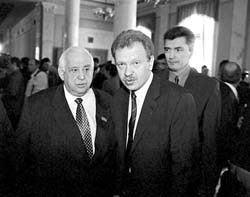Russo-Ukrainian energy confrontation continues

Russia’s decision to levy the VAT on imports from Ukraine and Ukraine’s reciprocal move does not signal the start of a new trade war, President Kuchma said on July 3, noting that there are similar practices elsewhere in the world. These measures, however, will not benefit Ukraine, he added.
Unbalanced trade between both countries has made it impossible to reach an agreement to resume the link-up and parallel operation of Ukrainian and Russian power grids at late June talks in Moscow between Ukraine’s Vice Prime Minister Oleh Dubyna and his Russian counterpart Viktor Khristenko. As a condition for a link-up, Ukraine’s vice premier put forward a demand for a zero balance of electricity flow between the grids which should not exceed 50 million kWh per day one way. He also said that the issue of the Russian electricity transit via Ukraine can be discussed after the power grids have been hooked up. The Russians, however, insisted that Ukraine abide by the conditions of the memorandum on cooperation between Ukraine’s Ministry of Fuel and Energy and the United Energy Systems of Russia signed in Dnipropetrovsk on February 12 during the Ukrainian-Russian summit, demanding that Kyiv lift the ceilings for the flow of Russian electricity to Ukraine. The Russians also urged we specify the commercial terms for the supply of the Russian electricity to Ukraine.
Messrs. Dubyna and Khristenko have also discussed Ukrainian-Russian relations in the fuel/energy sector, specifically, the settlement by Ukraine of its debt for Russian fuel supplies, with Khristenko declaring that Ukraine will issue eurobonds for the amount of its $1.4 billion fuel debt to Russia. “The repayment of debt with securities should not be too burdensome for Ukraine,” Khristenko added condescendingly, reiterating once again Russia’s demand that Naftohaz Ukrayiny’s corporate debt for the Russian natural gas will be regarded as Ukraine’s state debt. Incidentally, new Prime Minister Anatoly Kinakh has already voiced his government’s opposition to the idea. In his comments on the relevant declaration made by the Russian Prime Minister Mikhail Kasianov, Mr. Kinakh expressed regret the Yushchenko’s government had earlier agreed to convert by April 30 of this year this corporate debt into securities issued under government guarantee, that is to recognize it as state debt. “I consider this inadmissible and contradictory not only to the laws of Ukraine but also to our economic interests,” the premier noted.
President Kuchma was even more resolute on the issue, saying Naftohaz Ukrayiny’s corporate debt for Russian natural gas must not under any circumstances be converted into state debt. He remarked that even if someone “pulls off this fraud (and recently many such ‘experts’ have appeared in Ukraine), my stand is final and nonnegotiable... If you have signed a wrong document, revoke your signature or do something else. In the area of international relations there is no room for puerile behavior.” Answering the question why no consensus has been reached on restructuring the Ukrainian gas debt, Mr. Kuchma noted that the question should be addressed to the former government, Interfax-Ukraine reports.
Faced with Moscow’s dragging its feet on any energy decisions, Ukraine has reciprocated in Europe, with the proposed hook-up of Ukraine’s and Poland’s electricity grids discussed the Friday before last by officials in Kyiv. Oleh Dubyna and Poland’s Vice Premier and Economy Minister Janus Steinhoff focused on the link-up of one of the Ukrainian power grids, the so-called Burshtyn Island, with the CENTRAL/ UCPTE system (presently, the power systems of Poland, Hungary, the Czech Republic and Slovakia form a single Central European system, CENTRAL, working in parallel with West Europe’s UCPTE power system). According to the Polish vice premier, the link-up of national systems can be carried out on a seasonal basis — to secure their greater efficiency. The officials also discussed the construction of a 750 kW power transmission line which will enable Ukraine to increase its export of electricity to Poland.
Simultaneously, Ukraine proposed to Poland to use Ukrainian natural gas reservoirs for seasonal and long-term storage, something which is viewed by many as a successful move to balance the construction of a gas pipeline bypassing Ukraine. Ukrainian Ministry of Fuel and Energy officials also say they are interested in selling gas to clients in Poland, while Poland stressed that it wants to receive the natural gas for its border infrastructure from Ukrainian pipelines.






